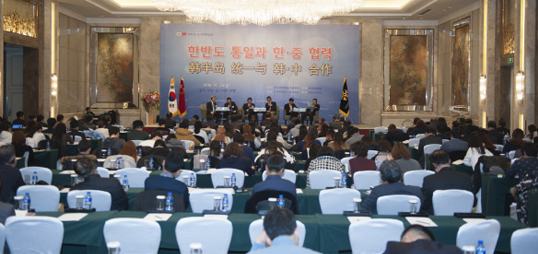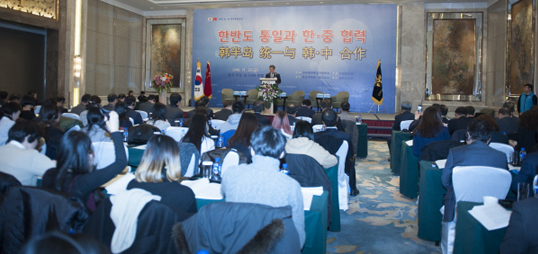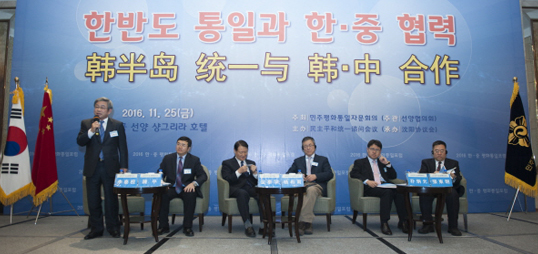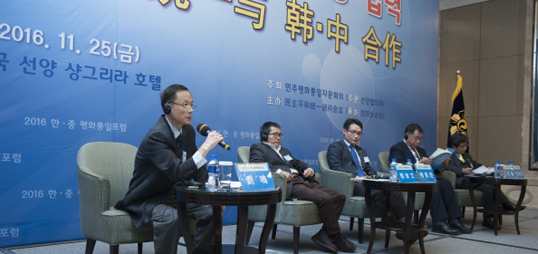Discussion on the unification of the Korean peninsula and direction of future-oriented Korea-China cooperation
The National Unification Advisory Council (Executive Vice-chairperson Yoo Ho-yeol, Secretary General Kwon Tae-oh), a constitutional advisory body directly under the President, held the Korea-China Peaceful Unification Forum on November 25 at the Shangri-La Hotel in Shenyang, China, with the participation of experts from Korea and China.
This forum, which was prepared to close the gap between perceptions by each country and expand the room for cooperation by having experts from Korea and China discuss the main issues of the Korean peninsula such as the North Korean nuclear program and THAAD, was themed “Unification of the Korean Peninsula and Korea-China Cooperation.” The event proceeded in order of Session 1. “North Korean Nuclear Program and Security of Northeast Asia,” Session 2. “China and the Korean Peninsula,” and general discussion.
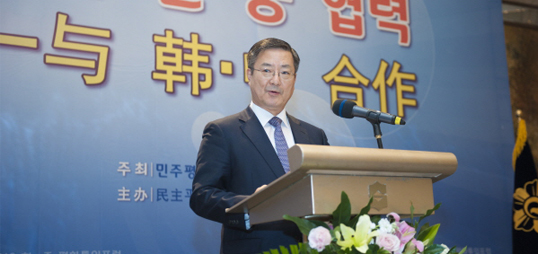
Secretary General Kwon Tae-oh giving a keynote address
In his keynote lecture, Kwon Tae-oh, Secretary General of NUAC, stressed that the peace and stability of Northeast Asia through the denuclearization of North Korea are a necessary condition to achieve China's dream. “Our citizens are hoping for a neighboring country that is truly concerned about the safety of the Korean peninsula and which shows a more responsible attitude of deterring North Korea's nuclear and missile provocations. Korea-US and Korea-China cooperation is more important than anything else in the process of peaceful unification of the Korean peninsula, and we hope that China provides even more cooperation and support in forming the conditions for the unification of the Korean peninsula through denuclearization and regime change of North Korea," he explained
[Session 1]
During Session 1, which was chaired by Lee Tae-hwan, Senior Research Fellow of the Center for China Studies at the Sejong Institute, Professor Kim Tae-woo of Konyang University explained that international interests have become complicated, and that a new Cold War structure has been heightened as the security order of Northeast Asia has been heavily influenced by 5 factors: the rise of China; the US checks against China; Russia's military resurgence; Japan's conservative leaning and rearmament, and; North Korea's nuclear program. "Korea has clarified that the deployment of THAAD is a temporary deployment that will undoubtedly be withdrawn once the North Korean nuclear threat is extinguished; if a Korean defense system with similar capabilities is developed even before that, THAAD can be withdrawn," he added.
According to Yang Xiyu, a researcher at the China Institute of International Studies, China's dilemma on the North Korean nuclear program is that the peace and stability of the Korean peninsula and denuclearization are like “both sides of a coin” wherein neither side can be given up. He went on to explain that China is in a strategically difficult “either-or situation” of whether to choose a North Korea that possesses nuclear weapons and maintains friendly relations with China or a denuclearized and collapsing North Korea that is hostile toward China.
Researcher Yang asserted that the methods of “conversation” and “compromise” cannot be relinquished as a solution to the North Korean nuclear program, and that North Korea must be persuaded that establishing normalization of relations and peaceful cooperation relationship with the outer world, including the US, is more advantageous for North Korea's safety than “nuclear deterrence."
"Although the conditions in the Korean peninsula and Northeast Asia are unstable, they have not reached a state of danger. Since the policies proposed by the international community on the issue of North Korea's nuclear program have been ineffective, North Korea should be recognized as a normal country, and Kim Jong-un should be seen as the leader of North Korea through reasoned, objective perspective,” said Chen Ping, Deputy Editor-in-Chief of Global Times.
According to Deputy Editor-in-Chief Chen, China has made various efforts to solve the problem of the North Korean nuclear program, but the result was damages from North Korea's nuclear experiment and criticism that China is leaving North Korea free to do anything. "We must take another look at the North Korean policies advocated by China until now and come up with an effective countermeasure," he stressed.
He also noted that the Chinese people were hugely disappointed over how Korea announced the deployment of THAAD right before the decision on the South China Sea came out from the Permanent Court of Arbitration (PCA), feeling betrayed that Korea attempted to solve a controversial issue by taking advantage of China's crisis.
According to Park Byung-kwang, Chief of Northeast Asian Studies at the Institute for National Security Strategy, the US and China share the same position on the goal of denuclearization of North Korea but harbor different positions about the specific means and methods. “In order to improve the effect of sanctions against North Korea, first, it must be emphasized that the presence and uncertainty of the Kim Jong-un regime can only act as a security threat to China as well. Second, using China's platform of a 'responsible power,' it must be emphasized that China must take more active and substantial actions. Third, it is necessary to propose a roadmap for convincing China, which contains preemptive pressure against North Korea regarding provocations such as North Korea's nuclear experiments and launches of long-distance rockets, or a 'balance sheet' comparing provocations and actions. Fourth, focus must be placed on the UN Security Council resolution for sanctions against North Korea following North Korea's 5th nuclear experiment, which must be much more strengthened than the existing Resolution 2270,” he explained.
Jiang Dong Ming, Deputy Head of the School of International Relations at Liaoning University, believes that the “One Belt One Road” strategy of nurturing the growth of economies of countries near China will alleviate the tension of the Korean peninsula and become the stage for promoting the economic cooperation of Northeast Asia.
[Session 2]
During Session 2, which was chaired by Liu Ming, Deputy Head of the Institute of International Issues at the Shanghai Academy of Social Sciences, Senior Researcher Deng Yuan of the Charhar Institute of China explained that, due to the nature of the North Korean regime, Chinese-style reform and opening are difficult, and that some capitalist elements will have to be introduced. "I think that Korea should persuade China, Russia, and the US to reconcile instead of following the US around," he added.
According to Yoo Dong-won, professor of security policy at Korea National Defense University, China attempts to stabilize relations with North Korea even while continuing international sanctions against North Korea due to the nuclear program. “Considering the strategic value of South Korea, it appears that China will continue its efforts to further the development of relations with South Korea in spite of the conflict between China and South Korea caused by the decision to deploy THAAD," he said.
Lu Chao, a researcher at the Institute of Social Sciences at Liaoning University, noted that the economic sanctions against North Korea have shaken the sentiment of the North Korean people. “With the tremendous effect on North Korea's air force and navy caused by the setback in North Korean military industry production and ban on export of liquid aviation fuel, North Korea will have difficulty promoting economic development and nuclear research simultaneously in a situation wherein even the basic needs of its citizens cannot be guaranteed," he explained.
According to Kim Sang-soon, Director of the East Asia Peace Institute, as a measure of Korea-China cooperation on the problem of the North Korean nuclear program, expectation on China should be lowered as much as possible, and negotiation capability toward China should be improved. The settlement of the problem of the North Korean nuclear program and the Korean peninsula after unification must be discussed with the “Korea-China Big Deal” and “Korea-US-China Triangular Big Deal, he added.
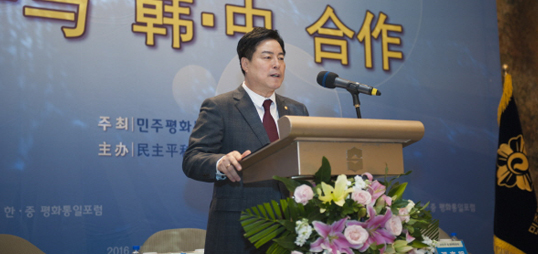
Ahn Choung-rak, Head of Shenyang Chapter, giving an opening address
"70% of the trade between North Korea and China are carried out here in Shenyang, bordering North Korea with Amnokgang River and Dumangang River in between; the 3 Northeastern Provinces where 1,650,000 ethnic Koreans are residing will play the role of a crucial bridge in forming the environment for unification, making for a location with strategic value; they are expected to be the greatest beneficiary of unification. This serves as an opportunity for everyone to take more interest in the peaceful unification of the Korean peninsula and to take part in preparing for unification,” said Ahn Choung-rak, Head of the NUAC Shenyang Chapter, in his opening address.

Shin Bong-sub, Consul General of the Republic of Korea in Shenyang, giving a congratulatory address
Shin Bong-sub, Consul General of the Republic of Korea in Shenyang, noted that the biggest victims of the security dimensions and repercussions brought about by North Korea's nuclear armament are Korea and China. “Since the issues of the North Korean nuclear program and THAAD are not separate independent variables but principal and accessory variables that will automatically be resolved if the cause is eliminated, Korea and China are cooperative partners that must jointly respond to the problem of the North Korean nuclear program instead of being in conflict with each other," he stressed.
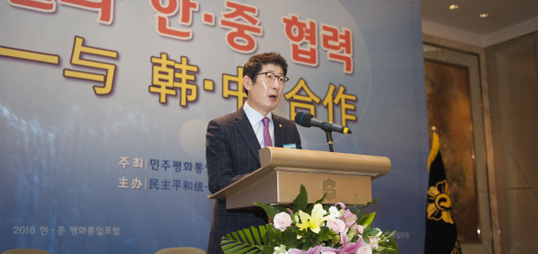
Lee Chang-ho, Vice-chairperson of the Council of China
Lee Chang-ho, Vice-chairperson of the Council of China, expressed hope that the Korea-China Peaceful Unification Forum becomes an opportunity to improve trust between the two nations and expand cooperation for peaceful unification, blowing a spring breeze of peaceful unification that is never frozen again.
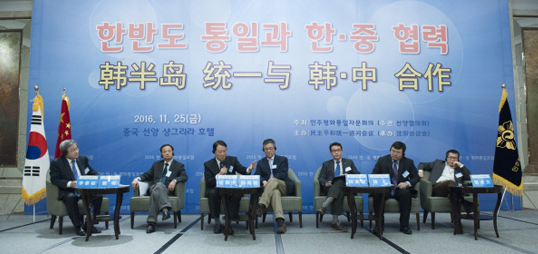
General Discussions
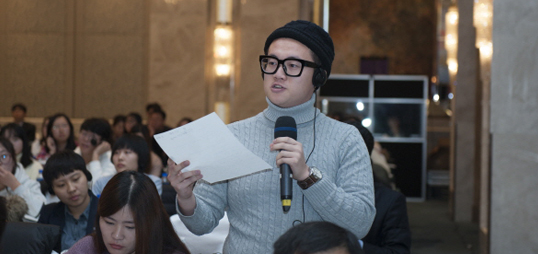
Question and Answer
Some sinologists expressed their honest opinions in this forum, i.e., in the face of the dilemma of North Korea-China relations, China is regarding North Korea as a “strategic shield” and agonizing over choosing between “denuclearization” and “stability” of North Korea. Thus, it appears that our government will have to work particularly harder to change China's perception of North Korea so that China regards North Korea as a “strategic burden” rather than a “strategic asset” or a “buffer zone.”


